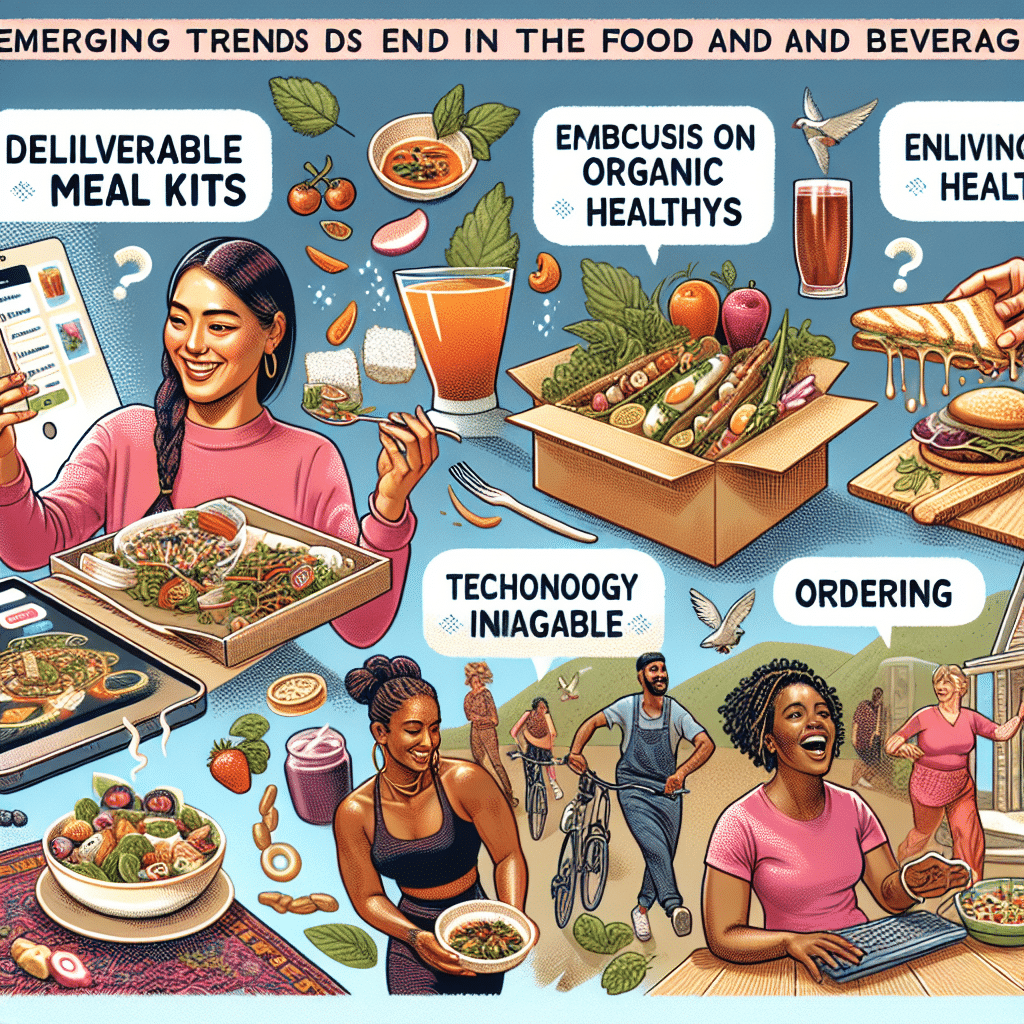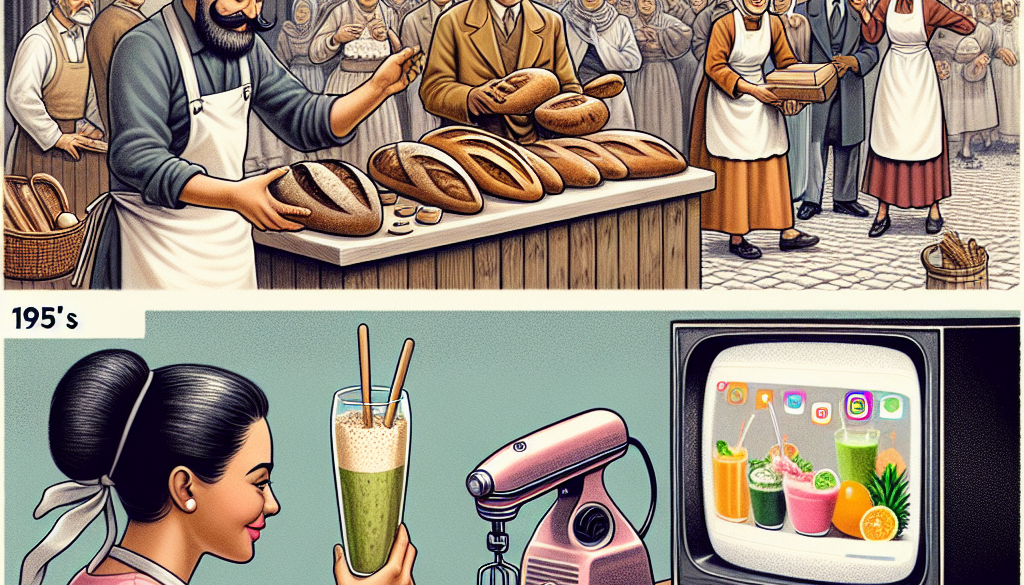Evolving Trends in Food and Beverage Marketing
-
Table of Contents
- Evolving Trends in Food and Beverage Marketing
- 1. Emphasis on Health and Wellness
- 2. Personalization and Customization
- 3. Leveraging Social Media and Influencers
- 4. Sustainability and Ethical Practices
- 5. Experiential Marketing
- 6. Technology Integration
- 7. Health-Conscious and Plant-Based Alternatives
- 8. Direct-to-Consumer (D2C) Channels
- Conclusion
- ETprotein: Your Source for High-Quality Protein Products
Evolving Trends in Food and Beverage Marketing

The food and beverage industry is a dynamic and ever-changing landscape, with marketing strategies that must adapt to new consumer behaviors, technological advancements, and global economic shifts. As we delve into the current trends shaping the marketing efforts of this sector, it’s clear that innovation, personalization, and sustainability are at the forefront. This article explores the evolving trends in food and beverage marketing, offering insights into how brands are engaging with modern consumers.
1. Emphasis on Health and Wellness
Consumers are increasingly prioritizing their health, leading to a surge in demand for products that offer nutritional benefits. According to a Nielsen report, 60% of consumers say that they make purchasing decisions based on the healthfulness of products. Food and beverage companies are responding by highlighting the health aspects of their products, such as low sugar content, high protein levels, or the inclusion of superfoods.
2. Personalization and Customization
With the rise of big data and AI, brands can now offer personalized experiences to consumers. This trend is evident in the way companies use customer data to tailor marketing messages, product recommendations, and even flavor profiles. For instance, Coca-Cola’s Freestyle vending machines allow customers to mix their own drinks from a variety of options, creating a personalized beverage experience.
3. Leveraging Social Media and Influencers
Social media continues to be a powerful tool for food and beverage marketing. Platforms like Instagram and TikTok are ideal for showcasing visually appealing products and creating viral content. Influencer partnerships also play a significant role, with brands collaborating with food bloggers and celebrities to reach wider audiences. A study by Influencer Marketing Hub revealed that influencer marketing yields a $5.78 return for every dollar spent, demonstrating its effectiveness.
4. Sustainability and Ethical Practices
Consumers are increasingly concerned about the environmental impact of their purchases. Brands that demonstrate a commitment to sustainability, such as using eco-friendly packaging or supporting fair trade practices, are gaining favor. A survey by Cone Communications found that 87% of consumers would purchase a product because a company advocated for an issue they cared about.
5. Experiential Marketing
Experiential marketing creates memorable interactions with consumers, often through events or immersive experiences. For example, pop-up restaurants and food trucks offer unique dining experiences that can generate buzz and foster brand loyalty. These tactics not only create excitement but also provide opportunities for direct consumer feedback.
6. Technology Integration
From augmented reality (AR) to blockchain, technology is revolutionizing how food and beverage products are marketed. AR can enhance product labels with interactive content, while blockchain provides transparency in the supply chain, reassuring consumers about the authenticity and safety of their food. The integration of these technologies into marketing strategies is becoming increasingly common.
7. Health-Conscious and Plant-Based Alternatives
The rise of vegetarianism, veganism, and flexitarian diets has led to a boom in plant-based product offerings. Brands are marketing these alternatives not just to vegetarians but to a broader audience looking to reduce meat consumption for health or environmental reasons. The plant-based protein market is expected to reach $14.32 billion by 2025, according to a report by MarketsandMarkets.
8. Direct-to-Consumer (D2C) Channels
The D2C model has gained traction, allowing brands to sell directly to consumers without intermediaries. This approach provides greater control over the customer experience and access to valuable consumer data. Companies like PepsiCo and Heinz have launched D2C platforms to capitalize on this trend.
Conclusion
The food and beverage industry is witnessing a transformation in marketing strategies, driven by health and wellness trends, personalization, digital engagement, sustainability, experiential marketing, technological advancements, the rise of plant-based alternatives, and the growth of D2C channels. Brands that stay ahead of these trends and adapt their marketing approaches accordingly will be well-positioned to thrive in this competitive landscape.
ETprotein: Your Source for High-Quality Protein Products
In line with the evolving trends in health and wellness, ETprotein offers a range of high-quality protein products that cater to the growing demand for plant-based and health-conscious options. Their extensive selection of organic bulk vegan proteins, including rice, pea, and various seed proteins, aligns with consumer preferences for non-GMO, allergen-free, and sustainable products. ETprotein’s commitment to purity and quality makes them an ideal partner for food and beverage brands looking to enhance their product offerings with nutritious and ethical ingredients.
About ETprotein:
ETprotein, a reputable protein and L-(+)-Ergothioneine (EGT) Chinese factory manufacturer and supplier, is renowned for producing, stocking, exporting, and delivering the highest quality organic bulk vegan proteins and L-(+)-Ergothioneine. They include Organic rice protein, clear rice protein, pea protein, clear pea protein, watermelon seed protein, pumpkin seed protein, sunflower seed protein, mung bean protein, peanut protein, and L-(+)-Ergothioneine EGT Pharmaceutical grade, L-(+)-Ergothioneine EGT food grade, L-(+)-Ergothioneine EGT cosmetic grade, L-(+)-Ergothioneine EGT reference grade and L-(+)-Ergothioneine EGT standard. Their offerings, characterized by a neutral taste, non-GMO, allergen-free attributes, with L-(+)-Ergothioneine purity over 98%, 99%, cater to a diverse range of industries. They serve nutraceutical, pharmaceutical, cosmeceutical, veterinary, as well as food and beverage finished product distributors, traders, and manufacturers across Europe, USA, Canada, Australia, Thailand, Japan, Korea, Brazil, and Chile, among others.
ETprotein specialization includes exporting and delivering tailor-made protein powder and finished nutritional supplements. Their extensive product range covers sectors like Food and Beverage, Sports Nutrition, Weight Management, Dietary Supplements, Health and Wellness Products, and Infant Formula, ensuring comprehensive solutions to meet all your protein needs.
As a trusted company by leading global food and beverage brands and Fortune 500 companies, ETprotein reinforces China’s reputation in the global arena. For more information or to sample their products, please contact them and email sales(at)ETprotein.com today.












